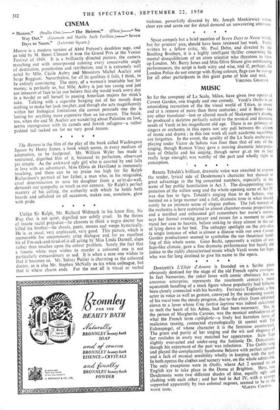CINEMA
gg Marion." (Studio One.)---A, The Heiress." - 1Plaza.)----tg No Way Out." (Gaumont and Marble Arch Pavilion.).--“Seven Days to Noon." (Leiceste'r Square.) Manon is a modern version of Abbe Prevost's deathless saga, and as told by M. Henri Clouzot it won the Grand Prix at the Venice Festival of 1949. It is a brilliantly directed picture, the camera searching out with unsurpassed- cunning every conceivable angle of destitution, prostitution and retribution, and it is extremely well acted by Mlle. Cecile Aubry and Messieurs Michel Auclair and Serge Reggiani. Nevertheless, for all its qualities it fails, I think, to be entirely convincing. The story, of a woman's insatiable lust for money, is perfectly so, but Mlle. Anbry is just too young and just too innocent of face to let one believe that she would work every day in a bordel or sell herself to passing American majors for mink's sake. Talking with a cigarette hanging out of her mouth does nothing to make her look tougher, and though she acts magnificently within her biological limitations she cannot persuade one she is lusting for anything more expensive than an ice-cream. The finale, too, when she and M. Auclair are wandering about Palestine on foot, seems incongruous with its camels and Jewish refugees—a rather padded tail tacked on for no very good reason.- The Heiress is the film of the play of the book called Washington Square by Henry James, a book which seems, in every medium of adaptation, to be foolproof. Mr. William Wyler has made a restrained, dignified film of it, balanced to perfection, observant yet simple. As the awkward ugly girl who is courted by and falls in love with an adventurer, Miss Olivia de Havilland is immensely touching, and there can be no praise too high for Sir Ralph Richardson's portrait of her father, a man who, in his misguided, cruel determination to save his daughter from a ne'er-do-well, demands our sympathy as much as our censure. Sir Ralph's perfect mastery of his calling, the authority with which he holds both boards and celluloid on all occasions, makes one, somehoW, glow with pride.
* * * * Unlike Sir Ralph, Mr. Richard Widmark in his latest film, No Way Out, is not quiet, dignified nor subtly cruel. In the throes of insane racial prejudice—he chooses to think a negro doctor has killed his brother—he shouts, pants, moans and weeps hysterically. He is, as usual, very unpleasant, very good. This picture, which is memorable for uncommonly crisp dialogue and for an excellent bit of I'm-sick-and-tired-of-it-all acting by Miss Linda Darnell, slaps rather than touches upon the colour problem. Surely the fact that a lunatic white man wishes to murder a coloured one is not particularly extraordinary or sad. It is when a sane one wishes to that it becomes so. Mr. Sidney Poitier is charming as the coloured doctor, as is also Mr. Stephen McNally as.-his white colleague, but that is where charm ends. For the rest all is visual or verbal
violence, powerfully directed by Mr. Joseph Mankiewicz whose clear eye and acute• ear for detail demand an unwavering attention.
* * * *
Space compels but a brief mention of Seven Days to Noon which, but for printers' pies, should have been reviewed last week. Partly written by a fellow critic, Mr. Paul Dehn, and directed by the Boulting Brothers, it is a highly intelligent thriller concerning the mental- disequilibrium of an, atom scientist who threatens to blow up London. Mr. Barry Jones and Miis Olive Sloane give outstanding performances, the script is both witty and wise, and if, perhaps, the London Police do not emerge with flying'colours, flags can be run up for all other participants in this giant game of hide and seek.






































 Previous page
Previous page